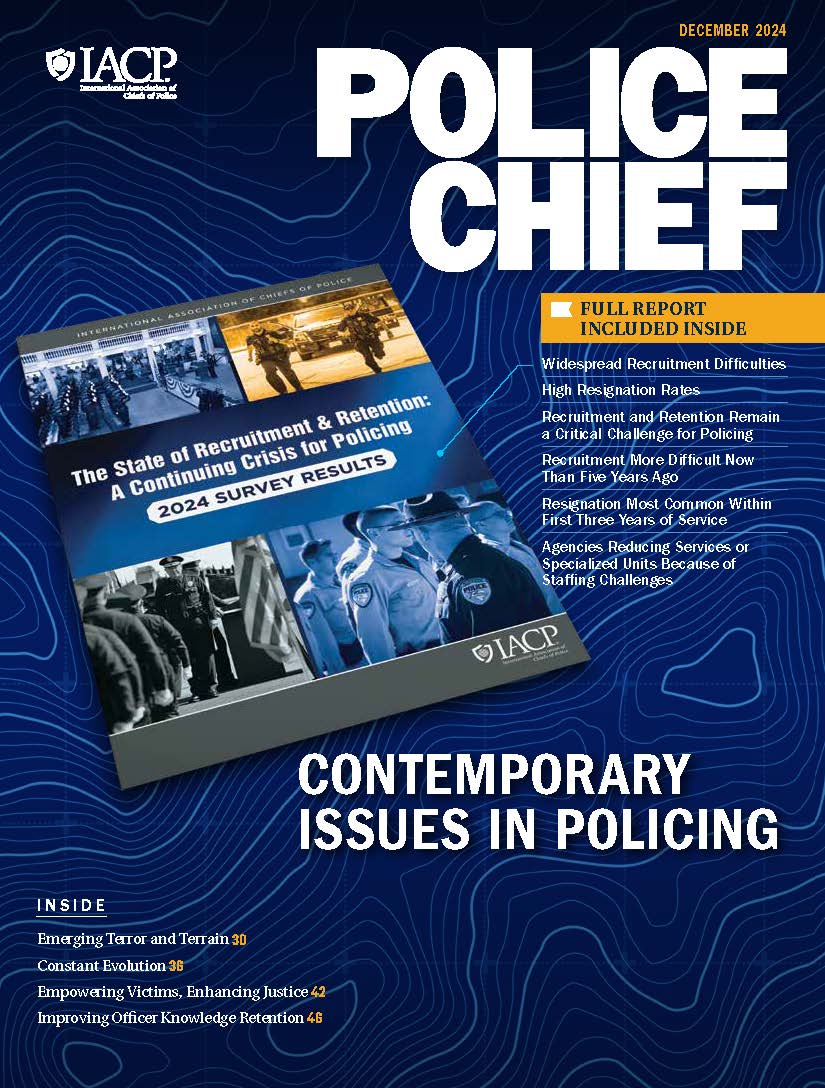 Each and every day, law enforcement agencies and officers throughout the United States face a remarkable array of challenges as they strive to fulfill their mission of protecting the public. The landscape on which they operate is ever changing, the crimes they investigate are growing increasingly complex, and the threats they face are constantly evolving.
Each and every day, law enforcement agencies and officers throughout the United States face a remarkable array of challenges as they strive to fulfill their mission of protecting the public. The landscape on which they operate is ever changing, the crimes they investigate are growing increasingly complex, and the threats they face are constantly evolving.
At the same time, law enforcement’s traditional responsibilities have not been diminished. Violent crime remains at unacceptably high levels, and our agency resources are stretched to the limit. It is a difficult road ahead, and we do not have a clear path forward.
To that end, we need to provide the nation with a strategic plan that will guide an integrated public safety and homeland security effort in the years ahead.
Law enforcement and the criminal justice community have faced this dilemma before. In July 1965, President Lyndon Johnson issued an executive order establishing the President’s Commission on Law Enforcement and Administration of Justice recognizing, as he said, “the urgency of the nation’s crime problem.” The commission labored for a year and a half, producing 200 specific recommendations involving federal, state, and local governments, civic organizations, religious institutions, business groups, and individual citizens that were intended to create a safer and more just society.
The IACP believes that the work of that commission and the recommendations it produced marked the beginning of a sea change in our methods for dealing with crime and the public and built the framework for many of the highly effective law enforcement and public safety initiatives that have been in place for the last 40 years.
That is why, for more than 20 years, the IACP has advocated for the creation of a commission that would follow in the footsteps of the 1965 presidential Commission on Law Enforcement and the Administration of Justice.
Our mission has changed substantially since 1965; each day, law enforcement and other criminal justice agencies in these communities are confronting a vast array of new challenges and demands that would have seemed unimaginable just a short time ago. We are now confronted with protecting the homeland, violent crime increases, unsolved and complex immigration issues, overburdened prisons, increased illegal firearm trafficking and violence, continued drug trafficking, overburdened court systems, and DNA technological advances.
Coupled with these pressures is the continuing need to ensure the protection of civil rights and civil liberties that are central to a strong community–police relationship and therefore vital to our crime-fighting and homeland security efforts.
It is for these reasons that the IACP is so pleased to support the National Criminal Justice Commission Act (S. 714). The legislation, introduced by Senator Jim Webb (D-VA), would create a commission charged with comprehensively reviewing the nation’s criminal justice system and offering concrete recommendations to address the public safety challenges confronting the United States. S. 714 has gained the bipartisan support of 35 members of the Senate and endorsements from over 100 organizations representing a broad spectrum of the criminal justice community.
The National Criminal Justice Commission Act will provide the nation with the opportunity to examine and develop recommendations addressing the broad range of new and emerging challenges that confront law enforcement today, from cybercrime to nontraditional organized crime, from violent street gangs to homeland security. It will also address the critically important issues of fairness and equality of treatment that are imperative to maintaining a community’s trust in the criminal justice system. Finally, the commission will also be reviewing the impact of and the difficulties and opportunities that are presented to the criminal justice community by technological innovations.
Earlier this year, the Senate Judiciary Committee approved the National Criminal Justice Commission Act, and the bill is currently awaiting action by the full Senate. To ensure passage of this legislation, it is imperative that the law enforcement community clearly demonstrate and communicate its support for this critically important and long overdue commission.
To that end, last month during a Capitol Hill press conference held in conjunction with IACP’s Day on the Hill, I was proud to stand with police chiefs from around the United States and several members of the United States Senate to express the IACP’s strong support for the National Criminal Justice Commission Act. While important, this event was just one element in IACP’s strategy to gain passage for this vital legislation. In order to succeed, we need your help.
Your elected representatives need to hear from you. They need to know that you, as a leader in the public safety community, want them to support the National Criminal Justice Commission Act. For assistance in this effort, please visit the IACP Legislative Action Center (http://capwiz.com/theiacp/home) where you will find a sample letter that can easily be sent to your elected officials.
I thank you for your assistance in pushing this legislation toward final passage. ■
Please cite as:
Michael J. Carroll, “A Strategic Plan for Law Enforcement,” President’s Message, The Police Chief 77 (April 2010): 6.


